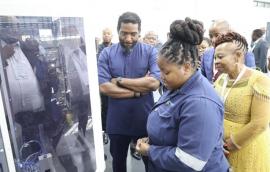
Higher Education, Science and Innovation Deputy Minister, Buti Manamela, says the establishment of the Indwe 4IR Lab positions the Ekurhuleni East TVET College as a transformative hub for communities.
Manamela made the remarks during the launch of the Indwe Fourth Industrial Revolution (4IR) Lab at the Ekurhuleni East TVET College’s Artisan and Skills Development Centre on Tuesday.
The state-of-the-art lab is set to provide staff and students at the TVET (Technical Vocational Education and Training) college with cutting-edge skills pertinent to 4IR.
The establishment of the Indwe 4IR Lab is a direct result of a collaborative private-public partnership involving the Manufacturing, Engineering and Related Services Sector Education and Training Authority (merSETA), Festo Didactic and the Ekurhuleni East TVET College.
Festo Didactic offers state-of-the-art learning concepts for technical basic and further training.The company’s customers include vocational colleges, universities, research centres, educational institutes and industrial companies all over the world.
The strategic alliance aims to introduce comprehensive 4IR educational programmes that will significantly boost the employability and productivity of the workforce, as well as enhance the capacity-building efforts for staff at TVET colleges.
Speaking at the launch, Manamela said the launch of the lab must be viewed as part of government’s strategic goals such as developing the relevant skills to help address the country’s pressing socio-economic challenges, but also “help steer our economy from being resource driven to one that is more knowledge driven.”
Manamela said the advent of the 4IR has rendered some skills and jobs obsolete, which will require the country to reimagine the content of what is taught at universities and TVET colleges, as well as their role in society.
“The other priority that our embrace of the 4IR must help us to address is the issue of youth unemployment and in particular, the disturbing phenomenon where over two million of our young people, are not in any form of employment, education, or training, what is commonly referred to as the NEET problem.
“As a country, we can’t hope to sustain our key national goals of skills development, education, and employment, if an important section of our population-our young people-are not in any form of schooling or training. This is a huge risk that threatens to undo much of the progress we have made thus far in education and skills development,” Manamela explained.
The Deputy Minister said the launch of the Indwe 4IR Lab also forms part the department’s programme to equip TVET colleges with 4IR related capacity.
“The Indwe 4IR Lab is also envisioned as a vibrant hub of creativity and innovation, offering opportunities for young people to engage with cutting-edge technologies. It also imagined to be a space where young people can acquire skills in exciting areas such as robotics, 3D printing, the Internet of Things, and advanced wireless technologies.
“These skills are no longer optional but essential for success and prosperity in the digital age. There is therefore no doubt the establishment of Indwe 4IR Lab also positions the Ekurhuleni East TVET College as a transformative hub for the communities of Ekurhuleni,” he said.
Equipping young people
Manamela also encouraged the TVET college to reach out to the surrounding community and open its doors for the youth and young adults to access the cutting-edge technologies that can equip them with the knowledge and skills to get out of the debilitating grip of poverty and unemployment.
“As the Department of Higher Education, we remain steadfast in our support for visionary initiatives such as the Indwe 4IR Lab and this is because we value the role of our TVET colleges in equipping our young people with the skills, not only to pursue relevant careers, but also for them to be able to earn a living from what they are taught,” Manamela said.
The introduction of 4IR programmes to TVET colleges initiative started at Maluti TVET College in the Free State, with Ekurhuleni East TVET College being the second beneficiary.
The department said the initiative will be rolled out to additional TVETs nationwide, including Ehlanzeni in Mpumalanga; Lovedale Eastern Cape; Majuba in KwaZulu-Natal; Northern Cape Urban; South West Gauteng; Waterberg in Limpopo; West Coast in the Western Cape; and Taletso in North West Province. – SAnews.gov.za


